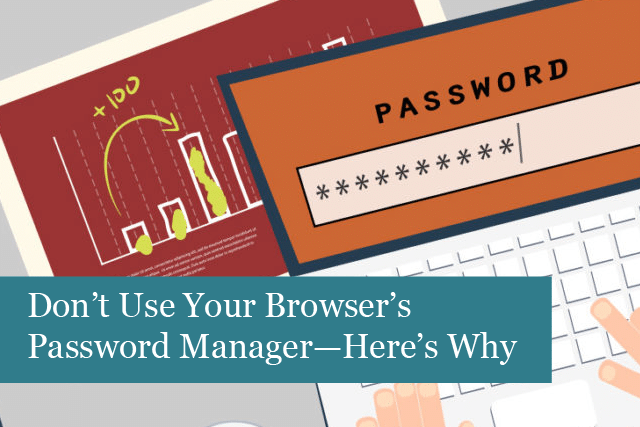
Each major browser includes a built-in password manager. While using these tools may seem safe and convenient, are they really safe? Will your passwords stay safe? What about your business passwords, are they safely stored in a browser password manager?
These are some of the questions we’ll address in this article. There’s no question that user a password manager can make life easier. But you want to ensure you’re not also making it easier for cybercriminals to steal valuable passwords.
What is a Built-In Browser Password Manager?
Most of the major browsers give you the option of saving your passwords. They do this by including a built-in password manager, which is included in the browser. These browser password management tools are usually very easy to use.
When you are on a page that requests a password, a small popup appears on the screen asking if you’d like the browser to remember your password. If so, the browser saves the password for the site you’re on.
Advantages & Disadvantages of Browser Password Managers
One of the main benefits of a built-in browser password manager is that you can easily and quickly save passwords for the sites you regularly visit. There’s no app to download and learn how to use and these tools are free. You also won’t have to pay a subscription fee for the browser password manager. What’s more, your passwords are synced across devices.
Another benefit of using a browser password manager is that they auto-fill logins for you. Each time you visit a website that requires a login, the browser auto-fills your username and password. That means you don’t have to look the data up and type it into the online form. That’s pretty convenient.
However, each time you want to access a specific site, you’ll need to use the same browser you used last time. The password manager will not work in any other browser. So, if you like to use different browsers on a regular basis, you’ll need to have all passwords saved in each browser you use. In addition, you’ll need to update and change these passwords about every six months to keep your data secure.
Browser password managers are also usually basic services. If you want more advanced security for your passwords, it’s usually necessary to upgrade to the paid service.
In addition, when it’s time to change the password, the browser password manager doesn’t help you create a new password. While they are capable of generating a unique, strong password, they don’t allow you to customise the password in any way. You’ll have to come up with unique, creative passwords on your own. If you have many online accounts, this can be a time-consuming process.
Are Browser Password Managers Secure?
While browser password managers are better than in the past, they still aren’t the best choice when it comes to saving your passwords securely. Let’s take a look at why that is.
1. Browser Password Managers Are Not as Secure
Browser password managers are not as secure as dedicated password managers. For one thing, most browser password managers don’t use a master password to encrypt your login details (though some browsers do offer this feature).
For browser password managers that don’t encrypt your data, it’s possible for anyone who accesses your computer to enter into the setting and find your stored login credentials. The person can then visit each site and, using the auto-fill function, gain access to your online accounts.
2. Password Security is Tied to Browser Security
For anyone that uses the sync function to ensure passwords are saved across their devices, their passwords are stored in the cloud. Even if they’re encrypted, it’s still possible to someone to gain access to your account if they hack the browser.
This is one reason it’s imperative to use 2-step authentication for your online accounts.
Another issue is that if the browser service is hacked, criminals can gain access to all of your accounts.
3. Difficult to Change to Another Browser
If you’re using a specific browser’s password manager, you’re stuck. Browser-specific password managers don’t allow you to use your login credentials on other browsers. For instance, if you have login information saved in Microsoft Edge, you won’t be able to access these in Google Chrome.
This is a huge problem for anyone that likes to use various browsers. Built-in password managers don’t offer the flexibility you may need if you use more than one browser.
Why It’s Best to Use a Dedicated Password Manager
So, what’s the other option than the browser’s built-in password manager? The best choice is to use a dedicated password manager. Dedicated password managers usually have an added layer of security and often use two-factor authentication. With a dedicated password manager, you only need to remember one master password to access your other passwords.
What’s more, dedicated password managers also include security checks and let you know when it’s time to change your passwords. They usually offer to auto-generate new passwords. And they make it easy to customise each password as necessary. Most of these stand-alone password managers allow you to choose the length of the password, which symbols to include/exclude, and more.
Third-party password managers are also designed to offer you more flexibility. They work across any browser you use. When the tool has been installed, you can log into any service on any browser, on any device. You have all the flexibility you need or want with a dedicated password manager.
Another benefit of using a stand-alone password manager is the ability to share passwords with others. For instance, if you’re a business owner, using a dedicated password manager can help you share important accounts with certain employees. The same goes if you have family accounts. The third-party password manager makes it easier for the entire family to log into family accounts, such as streaming services and more.
Concluding Thoughts
Built-in browser password managers are not the best place to save your valuable login credentials. For improved security and flexibility, it’s best to choose a third-party password manager. Your online login credentials will be safer, synced across your devices, and more.
So, choose a recommended third-party password manager for your family or business and keep your passwords safe.
Recommended Posts

The Importance of Planning in Business IT Solutions
11th April 2025


